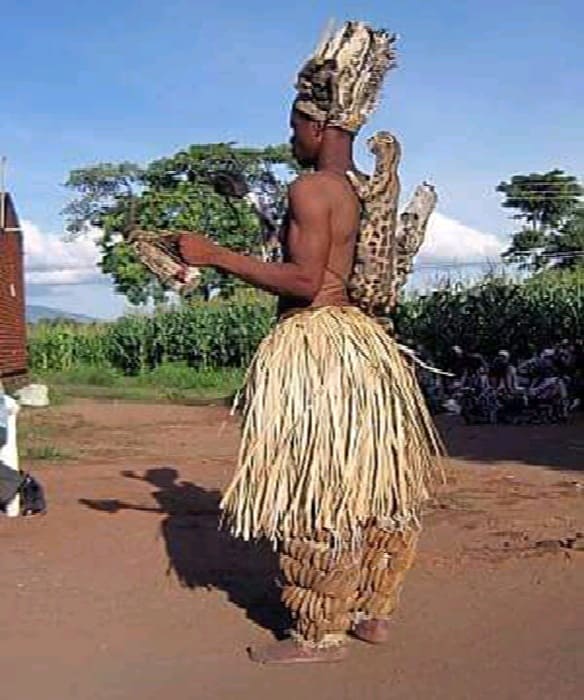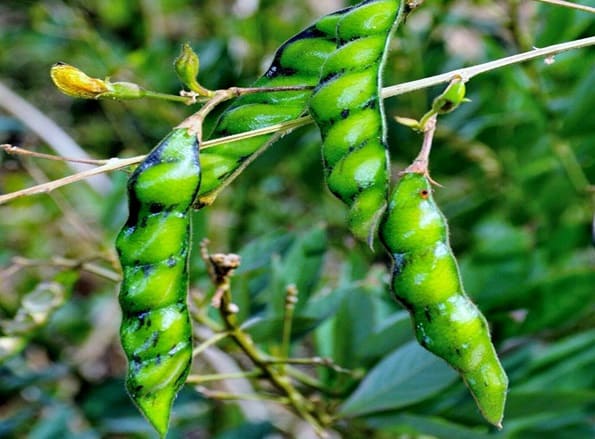がいることから、「アフリカの温かい心」と呼ばれるようになりました。
マラウイの人たちはとてもフレンドリーです。
淡水湖があり、さまざまな国から観光客が訪れます。
マラウイ湖とムランジェ山以外にも、マラウイでは文化的なダンスやその他の文化的な活動で海外からの観光客を魅了しています。
マラウイには多くの民族がいます。
ロムウェ、チェワ、ニャンジャ、ヤオ、トゥンブカ、セナ、トンガ、ンゴニなど、さまざまな民族がいます。
このように民族の数が異なるため、マラウイにはさまざまな部族が存在します。
北部はトゥンブカ族、中部はチェワ族、南部はロムウェ族が多く住んでいます。 ロムウェ族は、人が学び、交流することを熱望しなければならない興味深い人々です。
ロムウェ族には、他の部族と異なるユニークな点があります。伝統的な踊り、価値観や信念、お金を生み出す方法、話す言葉など、他の部族の人たちとは一線を画しています。
ロムウェの人々は、伝統的な踊りをはじめに、さまざまな種類の踊りを披露しています。
ジリ、リクワタ、チョパなどです。
これらの舞踊は女性が主役の舞踊です。
中でもチョパは最もよく踊られる伝統的な踊りで、卒業式や集会、青年会など、さまざまな場面で踊られます。 チョパの踊り手は、背中に荷物を背負い、手に農具を持ち、動物の皮、人形、狩猟具、古い台所用品を身に着けています。
ダンスは、円形に交差しながら踊るのが特徴です。
男性も女性も、そして若者も、「ムルハコ・ワ・アロムウェ」のような大きなイベントでも、チョパを踊ることが許されています。
次の写真は、チョパを踊る準備をしている人です。

さらに、ロムウェ族は独自の価値観と信念を持っている。
ロムウェ族は神とアラーを信じ、チナマリのような儀式を信じ、一夫多妻を許さない。
南部地域には様々な教会があり、人々はそこで祈り、礼拝をしています。
ザンベジ福音教会、中央長老教会、イスラム教会、エホバの証人教会、カトリック教会、セブンスデー・アドベンチスト教会などです。
ロムウェの人々は、イニシエーションについて、チナムワリ(Chinamwali)を信じています。
チナムワリは、思春期を迎えた少女を入信させる際に行われます。
女子のイニシエーションはチナムワリと呼ばれ、男子のイニシエーションはクヴィニラ(Kuvinira)と呼ばれます。
クヴィニラは、思春期に達した男の子をイニシエーションするときに行われます。 チナムワリでは、女の子はさまざまな道徳的行動を教えられ、料理の作り方やその他の家事も教わります。
男の子は、道徳的な行動、家の茅葺や掃除などの家事、その他学ぶべきことを教わります。
その上、ロムウェの人々は収入を得るために農業に大きく依存しています。
マラウイ南部では農作物と畜産の両方が行われています。
作物栽培では、この地域の熱帯性気候のためか、さまざまな種類の作物がよく育ちます。
紅茶、キマメ、メイズ、落花生などです。
また、この地域の人々は、食用や販売用の動物を飼育しています。
南部地域で飼育されている動物には、豚、鶏、山羊、アヒルなどがあります。
チョロとムランジェの一部では、人々はお茶に多くを依存しています。
自分の農園を持っている人もいれば、他の人の茶園で働いている人もいます。
ムランジェの別の地域、特にリンブリ地区の人々は、換金作物としてキマメを栽培しています。
この種のマメ科の作物は比較的高い値段で買い取られ、農家はそれで利益を得ています。
この作物は土壌中で窒素を固定するため、肥料を与える必要がないので、肥料などを減らすことができます。 次の写真は、農場のすぐそばにあるキマメの様子です。

他に挙げることとしては、ロムウェ族はチロムウェ語を話します。
チロムウェ語はマラウイ南部で、おそらくマラウイで最も難しい言語の一つです。
チロムウェ語は、エロムウェ語やムクア語とも呼ばれています。
年配の人が話すことが多く、ロムウェ族のほぼ4分の1は、この言語を話したり理解したりすることができません。
この言語は、子供たちが様々な言葉に頻繁に触れることで容易に習得することができますが、成熟した人が習得するのは困難です。
この言語が難しいのは、ほとんどの単語がチチェワ語の意味と同音異義語を持っていないため、話すときにそれを覚えてつなげるのが難しいからだと思います。 例えば、チヤオ語で「Utaandi」と言った場合、チチェワ語では「Ufa」、英語では「メイズの粉」という意味になります。
チロムウェ語では「Ufa」は「Othu」で、英語では「メイズの粉」を意味します。
一般に、ロムウェの人々は交流するのがとても面白い。
彼らは友好的で、働き者でもあります。
伝統的なダンスやその他の活動は、ロムウェの人々をひとつにまとめてくれます。
ムランジェ山の周辺に住んでいるため、様々な国や地域から来た多様な人々や部族と交流しています。
ロムウェ族は他者から多くを学び、必要であればいつでもお返しをすることができるのです。
Malawi is the warm heart of Africa.
The kindness of its people and beautiful wildlife it possesses made it to be named the warm heart of Africa.
People in Malawi are very friendly.
Malawi attracts tourists from different countries with its freshwater lake.
Excluding the freshwater lake (Lake Malawi) and the Mulanje mountain, tourists from abroad are also attracted with the cultural dances and other cultural activities in Malawi.
There are a number of ethics here in Malawi.
These include Lomwe, Chewa, Nyanja, Yawo, Tumbuka, Sena, Tonga and Ngoni, just to mention afew. Due to the different number of ethics, Malawi has different tribes.
The northern region is almost occupied with Tumbuka people, the central region is occupied mostly with Chewa people and Lomwe people dominate the southern region of Malawi.
Lomwe people are interesting people that one must be eager to learn and interact with.
There are different unique things that distinguishes Lomwe people from other people from different tribes.
Their traditional dances, their values and beliefs, ways of generating money and the language they speak distinguishes them from other people from other tribes.
To begin with traditional dances, Lomwe people perform different types of dances.
These include Jiri, Likwata and Tchopa.
These dances are female dominating dances. Amongst all the traditional dances, Tchopa is the most performed traditional dance.
It is performed during different occasions like during graduations, during public meetings and in youth clubs.
Tchopa dancers carry packs on their backs, hold farm tools in their hands, they wear animal skins, puppets, hunting gear and old kitchen utensils.
When dancing Tchopa dancers mostly move in a circle while crisscrossing each other.
Both males, females and even young people are allowed to dance Tchopa even during big occasions like during Mulhako wa alhomwe.
The following picture shows a person ready to dance Tchopa.

In additional to that, the Lomwe tribe has its own values and beliefs.
Lomwe people believe in God and Allah, they believe in initiation rites such as Chinamali, they do not allow polygamy.
Different churches operate in southern region where people pray and worship.
These includes Zambezi Evangelical Church (Z.E.C), Church of Central Presbyterian (CCAP), Islamic church, Jehovas witness church, Catholic church, Seventh Day Adventist church and many more.
On the initiations, Lomwe people believe in chinamwali.
Chinamwali is performed when initiating a girl who has reached puberty age.
Initiation of girls is called Chinamwali while initiation of boys is called Kuvinira.
Kuvinira is performed when initiating a boy who has reached a puberty age.
At Chinamwali, girls are taught different moral behaviors, they are taught how to cook food, and other household choirs.
For boys, they are taught moral behaviors, household choirs such as thatching houses and sweeping and other things that they deserve to learn.
On top of that, Lomwe people depend much on farming to generate income. Both crop and animal farming are practiced in southern region of Malawi.
On crop farming (crop production), different types of crops grow well in this region probably because of the tropical climate experienced in this region.
These include tea, pigeon peas, maize, groundnuts and other crops. People in these areas also raise animals both for food and for sale.
Some of the animals raised in southern region include pigs, chicken, goats, ducks and many more.
Thyolo and part of Mulanje people depend on tea much.
While some possess own farms, others work in other people’s tea farms. Another part of Mulanje particularly Limbuli constituency people dwell on pigeon peas as a cash crop.
This type of leguminous crop is purchased at a relatively high price and farmers make profits with it.
The fact that this crop fixes nitrogen in the soil, there is no need to apply fertilizer.
This reduces the total input.
The following picture shows pigeon peas right in the farm.

Excluding that, Lomwe people speaks chilomwe.
Chilomwe is one of the difficult languages in southern Malawi and probably in Malawi.
Chilomwe is also known as Elhomwe or Mukua language.
It is mostly spoken by elderly people and almost quarter of the Lomwe people fails to speak and understand this language.
It can be easily learnt by kids when they are frequently exposed to different words, and it is difficult for a matured person to learn it.
I think this language is more difficult because most of the words in this language have no homonyms with their Chichewa meaning this in turn makes it difficult for someone to remember and link them while speaking.
For instance, in Chiyawo if someone says “Utaandi” it means “Ufa” in Chichewa and it means “maize flour” in English. In Chilomwe “Ufa” is “Othu” which means “maize flour” in English.
In general, Lomwe people are very interesting to interact with.
They are friendly and are hard workers too.
The traditional dances and other activities bring Lomwe people together.
The fact that they surround Mulanje mountain, they are exposed to variety of people and tribes from different countries or districts.
Lomwes learn a lot from other and are capable of giving feedback whenever necessary.
Malawi ndi dziko la mkaka ndi uchi.Kukoma mtima kwa anthu ake komanso zinthu zokongola zimene zili ku Malawi kumakopa alendo ambiri ammayiko ozungulira angakhalenso ena akutali.
Kupatula nyanja yathu yaikulu (Lake Malawi) ndi Phiri lathu limene lili kumwera kwa dziko la Malawi, alendo osiyanasiyana amakopekaso ndi zikhalidwe zakumalawi kuno komanso magule athu.Kumalawi kuli mitundu yosiyanasiyana ya chikhalidwe ndi anthu.
Ina mwa mitunduyi ndi monga alomwe, achewa, anyanja, angoni, atumbuka , asena komanso atonga mongotchula ochepa.
Chifukwa chakuchuluka kwa mutundu ya anthu kuno kumalawi , zikhalidweso zilipo zosiyanasiyana.
Kumpoto kwa dziko la Malawi kwachulukira anthu achitumbuka, pakati pa dziko lino pachulukira achewa pamene alomwe ndi amene amanga linga kumwera kwa dziko la Malawi.Alomwe ndi anthu osangalasa kuwafufuza.
Pali zinthu zambiri zimene zimasiyanisa alomwe ku mitundu ina ya anthu kuno ku Malawi.
Kavalidwe ,chiyankhulo, magule awo, zikhulupiliro zawo ndizina zambiri zimathandizira kuwasiyanisa alomwe ndi anthu amitundu ina ku Malawi kuno.
Ndiyambe ndi magule amene alomwe amavina.
Anthu achilomwe amavina magule osiyanasiyana.
Ena mwa magulewa ndi monga Jiri, Likwata ndi tchopa.
Mmagule onsewa akadzi amakhala ochulukirapo poyerekeza ndi namabala ya amuna.
Tchopa ndi mmodzi mwa magule amene alomwe amakonda kwambiri kuvina.
Tchopa amavinidwa mmalo osiyanasiyana.
Guleyu anthu amavina nthawi zambiri akhala kuti akusangalala ndi zokolora zawo, mvula ikabwera nthawi yabwino, mmikumano yikuluyikulu komanso mmikumano ya achinyamata mmidzi.
Anthu ovina tchopa amabelekera zinthu zosiyanasiyana kumbuyo ndi mmanja mwawo.
Anthuwa amavina uku akuzungulira oyimba ng’oma uku akulowana lowana.
Zina mwa zinthu zimene amanyamula anthuwa akamavina ndi monga zikopa za nyama, zingwinjiri, maseche, ziwiya za kukhitchini zakutha komanso wenzulo.
Nthawi zambiri anthu ovina tchopa amavina asanavale chilichonse kuphanzi kwawo.
Tchopa sasankha msikhu wamunthu pankhani ya anthu ovina.
Achinyamata ang’onoang’ono amaloredwaso kuvinanawo tchopa angakhale mmikumano yaikulu monga pa mkumano waukulu wa mulhako wa alomwe.
Chithunzi chili mmusimu chikuonesa munthu amene wakomzeka kuvina gule wa tchopa.

Kuwonjedzera apo, alomwe ali ndi zikhulupiliro zosiyanasiyana.
Anthu achilomwe amapembeza Mulungu komanso ena amapembeza Allah.
Kumwera kwa dziko la Malawi kuli mipingo yosiyanasiyana.
Ina mwa mipingoyi ndi monga Zambezi Evangelical Church(Z.E.C), Church of Central African Presbyterian (CCAP), Islamic church, Mboni za Yehova, Catholic Church, Seventh Day Church komanso ndi mipingo ina.Anthu amapembeza ndi kulambira Milungu yawo mmipingo imeneyi.
Pankhani za Miyambo, alomwe amakhulupilira kuvinira ana awo.
Ana amuna amaviridwa akatha msikhu.
Kumeneku anawa amaphumzitsidwa makhalidwe oyenera mdziko komanso mdera, amalangizidwa zokhuza ulemu, amaphunzitsidwa ntchto zosiyanasiyana zapakhomo ndizina zowathandizira kukhala ndi anthu amitundu ina yosiyanasiyana.
Chinamwali chimachitika kwa mwana wamkazi yemwe watha msikhu.Kumenekuso azimayi amaphumzisa mwana wamkaziyu makhalidwe oyenera amdziko komanso mmdera, amaphunzitsidwa ntchito zapakhomo komanso zina zowathandiza kuti azikwanisa kukhala ndi amzawo amitundu yosiyanasiyana.
Zina mwa ntchto zimene achinyamata amaphumzitsidwa akamaviniridwa ndi monga kugwada akamapeleka moni kwa akulu komanso kulemekeza makolo awo.
Kuphatikizira apo, alomwe amadalira kwambiri ulimi.Alomwe amachita ulimi wa mbewu komanso ena amachita ulimi wa ziweto.
Mbewu zamitundu yosiyanasiyana zimalimidwaso kumwera kwa dziko la Malawi.
Zina mwa mbewuzi ndi monga tea, nandolo, mtedza, mzimbe, chamanga komanso tomato mongotchulapo zochepa.Pankhani ya ziweto, alomwe ena amaweta ziweto monga Abakha, nkhumba, nkhuku angakhalenso mbuzi.
M’boma la Thyolo ndi mbali ina ya Mulanje, anthu amadalira kwambiri ulimi wa tea.Anthu ena ali ndi minda yawoyawo ya tea pomwe ena amadalira kugwira timaganyu mminda ya ena.Mbali ina ya Mulanje anthu ambiri amadalira ulimi wa nandolo.
Nandolo ndi imozi mwa mbewu zimene sizifuna kuthiranso feteleza.
Mbewuyi imagulidwa pa mtengo wokwelerapo.
Ulimi oweta mbuzi watengaso malo kumwera kwa dziko la Malawi.
Anthu amaweta mbuzi pazifukwa zosiyanasiyana.
Mbuzi zimathandiza kupezako manyowa pambali poti anthu amadya.
Manyowa a mbuzi amagwiritsidwa ntchito kuthira mbewu zambiri zakudimba monga kabitchi, mpiru komanso tomato.
Chithunzi chili mmusimu chikuonesa mbewu ya nandolo ili mmunda.

Kupatula za ulimi, alomwe amasiyanitsidwa ndi mitundu ina ya anthu muno mmalawi kudzela mu chiyankhulo.
Alomwe amayankhula chiyankhulo chimene amachitchula kuti chilomwe kapena kuti elhomwe.
Chilomwe ndichimodzi mwa ziyankhulo zovuta kwambiri kumwera mwinanso kuno kumalawi.Chiyankhulochi chimayankhulidwa kwambiri ndi akuluakulu chifukwa chakuvuta kwake.
Ana amaphunzira chiyankhulochi mosavuta ngati akuyankhulidwa pafupipafupi ndipo zimatenge nthawi yaitali kuti munthu wamkulu ayambe kukwanisa kuyankhula ndikumva chilomwe.
Kumbali yanga ndikuona ngati chiyankhulochi ndichovuta chonchi chifukwa mawu amchilomwe ndi tanthauzo lake zimakhala zosemphana kapena kuti sizimveka mofanana zimene zimapangisa kuti zizivutilapo kulumikiza mawu mchiyankhulochi.Mwachitsanzo, mu chiyawo munthu akanena kuti “utaandi” zimafanana mkunena kuti “Ufa” mu chichewa kapena kuti “maize flour” mu chingerezi.
Mu chilomwe “ufa” ndi ” othu”.
Mongoomba mkuta, alomwe ndi anthu osangalasa kwambiri.
Chiyankhulo chawo, magule awo, zikhulupiliro zawo zimawasiyanisa anthuwa ndi mitundu ina ya anthu kuno kumalawi.Pankhani za ulimi, mbewu ndi ziweto zamitundu yambiri zimapezekaso kumwera.
Tea ndi Nandolo ndi mbewu zimene alomwe amadalira kwambiri kuti apeze phindu lochuluka mu ulimi.
Magule ndi zikhalidwe zimawasonkhanisa anthuwa malo amodzi nthawi zambiri. Mwachitsanzo, mkumano waukulu wa mulhako wa alomwe umasonkhanisa alomwe onse kumwera komanso ena amene ali mmaboma osiyanasiyana malo amodzi kuno kumalawi.
Chifukwa chakudzungulira phiri lalikulu la Mulanje, anthuwa amakumana ndi mitundu ya anthu osiyanasiyana.
Alendo ochokera maboma ambiri kuno kumalawi angakhalenso ochokera kunja ozawona phiri la Mulanje amalandilidwa ndi manja awiri kuno kumwera.
Mtundu wa anthu achilomwe uli mkuthekera kokhala ndi anthu amitundu ina mwabata komanso mwansangala.
ブロガー:フェストン・エドヴァンス・ヒッポ
Blogger: Feston Edvance Hippo
私の名前はフェストン・エドヴァンス・ヒッポです。
24歳独身、2人の子どものいる家庭に生まれ、その末っ子です。現在はリロングウェ農業自然資源大学(LUNAR)で農業管理の学位取得中です。
My name is Feston Edvance Hippo, a single man aged 24.Was born in a family of 2 children and am the last .Currently am doing my Bachelor’s degree in Agribusiness Management at Lilongwe University of Agriculture and Natural Resources (LUANAR).
Contact details: +265 996 262 285
WhatsApp : +265 883 747 855
Email : festonhippo000@gmail.com
Nationality : Malawi
District of Origin : Mulanje (Mzongwe village)
Residential District : Lilongwe (Bunda campus)

 Moni Malawi
Moni Malawi 